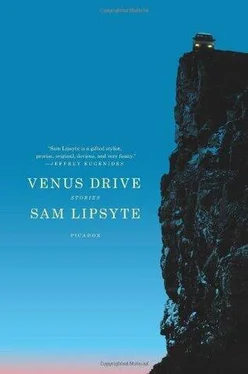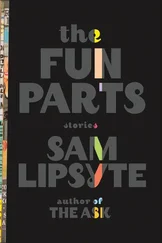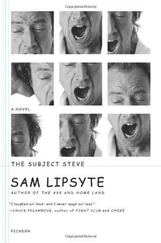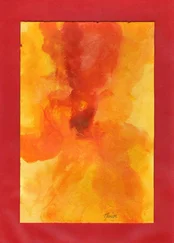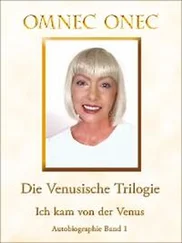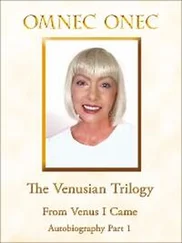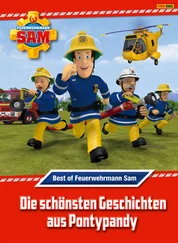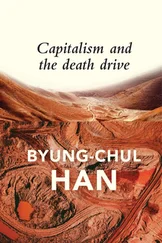“The what?
“The mend.”
“They took his thing off, right?”
“I don’t know.”
“You’ve seen it, right?”
“Not…no…” I said.
“Your old man,” she said, “he hid his pot on me.”
Then it was still winter. The miracles worked in slow reverse. Wine into water into walkway ice. They were pumping him with what he called the hard stuff. He wore a watchman’s cap and we gathered his hair from the sofa, the sink. My mother bought him a bigger bucket. It looked industrial.
“Don’t worry,” he told me, “I’ll be dead soon, but not before I’ve ascertained whether you’ve cleaned your room. So don’t think you can just wait it out.”
“Please, God, stop that,” said my mother.
“Stop what?” said my father. “Who are you talking to?”
I played with my Tonka dump truck. It was their gift to me for not wanting anything, for behaving, being quiet, remote. I was too old for it. I was remote anyway.
My father heaved. Sour sheets of air rushed out.
The Drury girl said we could make a surprise for my mother and father. They were due home in an hour. She dug around in her bag.
“Strip,” she said.
The Drury girl had a rubber stamp, an ink pad sunk in tin. She inked the stamp and took my arm, laid the cut rubber on it. “John A. Drury,” it read. “Notary Public.”
She said for me to shut my eyes.
“Why are we doing this?” I said.
“You want to be a rock star, right? This is it. The show of shows.”
“This is it?”
We rehearsed for a while.
“Wait,” she said. “One more thing.”
Now she reached down and took me in her fingers, twisted it a little, let it spring back of its own accord. She cupped her hand under, pinched, stretched, pressed the stamp in, let the flap pop back.
“Now you’re perfect,” she said. “Look.”
She spun me to the mirror. I was measled in her father’s ink.
We heard the Plymouth in the street.
“Hide,” said the Drury girl. “Don’t do it until I call your name.”
I hid behind the fall-away chair. I listened for noises I knew, galoshes, boots, the slash and saw of winter nylon. Here came the voice of him, the old voice, from before the stitches, the bucket, the braid. It carried over the frozen world. My mother’s voice stabbed at his pauses. These old rhythms of them, the tilt of happy talk.
They stood at the threshold, flushed, bundled things.
“Good news!” my mother said.
“Hold your horses,” said my father. “They’re not positive. They have to run more tests. But things are looking up.”
“More than up,” said my mother. “More than up.”
“We’ll see,” said my father, and laughed. “But, yeah, sure, maybe. Why not? Now where’s the little beast? Where is he? I want to see my boy. I’m going to take him somewhere. You hear that? We’re going to do something fun. Soon. You hear me? Where is he?”
I kept my crouch.
“Wait,” said the Drury girl, “I know where he is.”
The room filled with violins, static, saxophones, more static, more violins. There was a burst now, a hissing, gouts of feedback, guitar.
I eeled out from behind the chair, hips rolling, arms up, all of me thrown forward with whatever idea I had now of dancing. It was the Drury girl’s steps and more, some lewd concourse of the blowzy slides my mother favored and the neatened twirls of bandstand teens. I shook my ass at them, shook my inked ass at my mother, my father, and then, with some kind of stricken pivot, I flippered my tiny dick. It was dreamlike only in that I felt seized with secret logic. Time moved in the real, my body bucked in it, all these parts of me pocked with the public seal of our good neighbor. The Drury girl receded, as though stunned by consequence, easing toward flight. My mother wore her school-play face. I could sense annihilation underneath. My finale was confected from the Tonka toy. Thrusting upward, I held the truck out, glided my balls over the painted bed.
“Look!” I said to my father. “These are my people! Are you looking? Are you looking?”
“Stop!” my father shouted, almost the cry of a bullied child. He bolted from the room.
I felled myself, with theater, head down, arms out, the vaudevillian’s good-night wings.
The room got quiet. The Drury girl was gone.
My mother’s galoshes, rimed, wet, leaked on the carpet.
“Okay,” she said. “Okay, now.”
We could hear my father moving with steady violence in the kitchen.
“We know that wasn’t you,” said my mother. “Was that you?”
“Who?” I said.
My father lived and I lived. We live still. Later, years later, my mother died. I have her galoshes, with my bucket, in a box somewhere.
The Drury girl, we heard, got work at the town plaza. Sometimes I’d watch her run our strip of yard to the street, to a car revving there, to a boy at rest in his Naugahyde bounty, that great godly twitch of electric guitar when she opened his door, her roaring off from all that was lived here or near us.
Lucky for me I get a Larry tonight. Maybe he’s a wandering daddy Larry, all alone in the middle of lonely places somewhere. I run the screens, tug him through his ache. Probe to the negative, that’s what the training guide says. Poll, poll, poll, until you get a no. You’re golden when they don’t say no. You’ve gone to demo heaven. A Larry, though, is someone who is maybe lying. You can feel him through the wire. He wants to qualify. He wants to flee with you, wherever, away.
This Larry, he says, “Yes.”
Says, “Yes, yes, yes.” To work, to daddyhood. It’s a survey about the schools and we need family men, solid citizens, taxpayers, debt-payers, payers in kind. Lucky for me the Larry checks out. Now we can voyage together across the vast spectrum of human experience: Excellent, Fair, Good, Poor, I Don’t Know.
Choose, please.
“Good,” says the Larry, “good, excellent, fair, good.”
He never says, “Poor.”
He never says, “I don’t know.”
“How many kids did you say you have?” I say.
“Kids?” says the Larry.
“This only counts if you have kids.”
“The old lady has them. That’s why I’m out here. It’s me and the trees. My children are the trees, the sky. From where I stand, I can assfuck the moon.”
“Thank you for your time, sir,” I say.
“Thank me for my time! Thank me for my time! You think I don’t know what you’re trying to do to me? You goddamn mothership Jew!”
“You’ve been a real gentleman, sir.”
Here comes Frank the Fink, my monitor, all mission control with his clipboard, his headpiece. Maybe Frank was a decent guy once, but he’s management now. He sits with the other monitors at the edge of the room, eavesdrops, takes notes on our etiquette. Sometimes one of them will come over to your port with a personality tip.
“Start with hello,” they’ll say.
Frank lays off, though. I guess he thinks I would take it the wrong way, but I figure with a job like this, the higher you move up, the more of a tragedy you are.
“Hey,” says Frank. “Forget that nut. You’ll get a complete tonight, I can feel it.”
“Thanks, Frank,” I say.
Fuck off, Fink, I think, which is my thought of the day. I like to have one, it’s almost Buddhist. Yesterday’s thought was how did I get here, thirty-one, thirty-two, just this huge knot of unknowing and losing my hair. Big deal, you say. Male pattern baldness. But that’s the thing. There’s no pattern to it.
My last good thought was weeks ago and it wasn’t even a thought. It was a building I passed on the way to Cups. Limestone, or maybe soapstone, with gargoyle guys on the sills. Homunculi, maybe, if that’s the kind with the smirk. This was a building I knew from when I vaguely lived with a woman in it. She was fresh off the malls upstate, hungry to hurt herself. She wanted to write a history of art. She taught me all about Courbet and in return I went to Cups for both of us. Then she found some sculpture dealer’s dealer, high-end guy, come to your house with a leather bag, a book in German. Now the girl and I, we had nothing in common anymore.
Читать дальше
